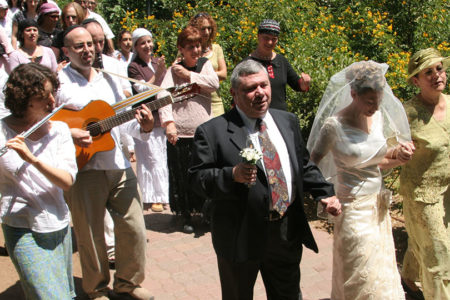1 Peter 2:9–10
First Peter 2:9–10 proves to be one of the most difficult passages in the New Testament to interpret. It states,
But you are a chosen generation, a royal priesthood, a holy nation, His own special people, that you may proclaim the praises of Him who called you out of darkness into His marvelous light; who once were not a people but are now the people of God, who had not obtained mercy but now have obtained mercy.
Because 1 Peter 2:9–10 was written several years after the church began on the day of Pentecost (Acts 2), the selection of words you are a chosen generation, a royal priesthood, a holy nation, His own special people has prompted more than one interpretation. It has done so because those words were related exclusively to the nation of Israel in Old Testament times before the church began.
After God delivered the people of Israel from their slavery in Egypt and brought them to Mount Sinai, He declared to them, “You shall be to Me a kingdom of priests and a holy nation” (Ex. 19:6). He thereby appointed Israel to be the spiritual leader of the whole world. It was to be different from the rest of the nations in the sense that it would worship exclusively the only true God, not the false gods of the other nations. The word translated “holy” means “divided.” God chose Israel to have a unique relationship with Him: “For you are a holy people to the Lord your God; the Lord your God has chosen you to be a people for Himself, a special treasure above all the peoples on the face of the earth” (Dt. 7:6; cf. 2 Sam. 7:23–24).
Later Israel rebelled against God by worshiping false gods, and the majority of Israel’s leaders rejected His Son as its Messiah and Savior.
The Permanent Replacement Interpretation
Permanent-Replacement theologians claims that, since the nation rejected God’s Son as its Messiah and Savior during His First Coming, God has forever rejected Israel as His special people and replaced it with the church. To them, 1 Peter 2:9–10 indicates the church is now the new Israel and that God has no present or future plan of blessing for Israel as a nation.
They overlook or allegorize the prophetic passages that reveal that, once Israel repents, the Messiah will return to Earth in His Second Coming and restore God’s theocratic Kingdom rule to Earth. Then Israel will become the spiritual leader of the world. Its capital city, Jerusalem, will become the spiritual and governmental center of the world. The people of all nations will go there to hear God’s Word taught by Christ and to be instructed concerning how God’s rule will be administered over them (Isa. 2:1–4). The people of the other nations will call the people of Israel “the priests of the Lord” and “the servants of our God” (61:6).
Thus says the Lord of hosts: “Peoples shall yet come, inhabitants of many cities; the inhabitants of one city shall go to another, saying, ‘Let us continue to go and pray before the Lord, and seek the Lord of hosts. I myself will go also.’ Yes, many peoples and strong nations shall come to seek the Lord of hosts in Jerusalem, and to pray before the Lord.” Thus says the Lord of hosts: “In those days ten men from every language of the nations shall grasp the sleeve of a Jewish man, saying, ‘Let us go with you, for we have heard that God is with you.’” (Zech. 8:20–23).
The Temporary Replacement Interpretation
Temporary-Replacement theologians claims that, since Israel rejected God’s Son at His First Coming, God has temporarily removed Israel from its original place of blessing and replaced it with the church. Thus the language of 1 Peter 2:9–10 indicates the church is now, in a figurative sense, the new Israel. Once the church is raptured from the earth and Israel repents and looks to its Messiah, then God will restore Israel to its original place of blessing with Him. Israel will become the spiritual leader of the world during Christ’s 1,000-year reign.
In conjunction with this interpretation, New Testament language scholar Friedrich Buchsel indicated that the Greek word genos, translated “generation” in the expression “chosen generation” (1 Pet. 2:9), is used “often in the NT for the Jewish people, e.g., at Gal. 1:14; Phil. 3:5; 2 Cor. 11:26; Acts 7:19 (cf. the LXX). It is used of Christians in the NT only at 1 Pet. 2:9.”1
In addition, another New Testament language scholar asserted that the Greek word laos, translated “nation” in the expression “holy nation” (1 Pet. 2:9), is used in a figurative sense “for the Christian community, e.g., in Acts 15:14; 18:10; Rom. 9:25f; 2Cor.6:16; Ti. 2:14; 1 Pet. 2:9 f.; Heb. 4:9; 8:10; 10:30; 13:12; Rev. 18:4; 21:3).”2
The New, Unified Institution Called “The Church” Interpretation
This interpretation claims that 1 Peter 2:9–10 expresses in words the new, unified institution called the church that God brought into existence after the rejection, death, resurrection, and ascension of Christ. It indicates the church is a unified institution of Jews and Gentiles who have placed their faith in Christ.
1 Peter 2:9 states: “You are a chosen generation, a royal priesthood, a holy nation, His own special people.” Those words are direct quotations from Exodus 19:6, Deuteronomy 7:6, and 2 Samuel 7:23–24 that refer exclusively to the people of Israel. Thus 1 Peter 2:9 refers specifically to Jewish members of the church.
New Testament language scholar Karl Ludwig Schmidt asserted that the Greek word ethnos, translated “nation” in the expression “holy nation” has “in view the Jewish people” in the following passages: Luke 7:5; 23:2; John 11:48, 50, 51, 52; 18:35; Acts 10:22; 24:2, 10, 17; 26:4; 28:19; 1 Peter 2:9.3
First Peter 2:10 refers to those “who once were not a people but are now the people of God, who had not obtained mercy but now have obtained mercy.” Several things should be noted concerning this reference.
(1) 1 Peter 2:10 refers to people who in the past were not a people of God and who had not obtained mercy. By contrast, the people of Israel in the past were the people of God and had experienced His mercy. This contrast indicates that 1 Peter 2:10 is not referring to the people of Israel (the Jews). It must be referring to Gentiles.
(2) The Greek text of 1 Peter 2:10 does not have the definite article “the” before the expression “people of God.” Thus it refers to people who were not “a” people of God, but are now “a” people of God. Since the Jews were God’s people in the past, the fact that the apostle Peter left out the definite article “the” in verse 10 must indicate he was referring to Gentiles.
(3) New Testament language scholar Rudolf Bultmann declared that 1 Peter 2:10 refers “to believing Gentiles.”4
(4) Some significant New Testament scholars believe Peter was writing 1 Peter to Gentiles and Jews. Concerning Gentiles, these scholars refer to some of Peter’s expressions that seem to relate specifically to Gentiles when they were unsaved: “not conforming yourselves to the former lusts, as in your ignorance” (1:14); should not “live the rest of his time in the flesh for the lusts of men” (4:2); “have spent enough of our past lifetime in doing the will of the Gentiles—when we walked in lewdness, lusts, drunkenness, revelries, drinking parties, and abominable idolatries” (4:3), and former friends “think it strange that you do not run with them in the same flood of dissipation, speaking evil of you” (4:4).5 These expressions are similar to what the apostle Paul said to Corinthian Gentile believers:
Do you not know that the unrighteous will not inherit the kingdom of God? Do not be deceived. Neither fornicators, nor idolaters, nor adulterers, nor homosexuals, nor sodomites, nor thieves, nor covetous, nor drunkards, nor revilers, nor extortioners will inherit the kingdom of God. And such were some of you. But you were washed, but you were sanctified, but you were justified in the name of the Lord Jesus and by the Spirit of our God (1 Cor. 6:9–11).
(5) Peter was the first person to lead Gentiles to faith in Christ after the church was born on the day of Pentecost. He thereby brought the first Gentiles into the church.
An angel told Cornelius, a Gentile Roman centurion, to have Peter brought to his house. As a Jew, Peter resisted going to the home of this Gentile, but the Spirit of God commanded him to go (Acts 10:1–33). When Peter entered Cornelius’s house and saw the Gentiles gathered there, he opened his mouth and said, “In truth I perceive that God shows no partiality. But in every nation whoever fears Him and works righteousness is accepted by Him” (vv. 34–35). That statement indicates Peter perceived God was beginning to do something new, removing “the middle wall of separation” that existed between Jews and Gentiles (Eph. 2:14).
As Peter spoke, “the Holy Spirit fell upon all those who heard the word.” As a result, all the Jewish believers who came with Peter “were astonished…because the gift of the Holy Spirit had been poured out on the Gentiles also” (Acts 10:44–45). In light of what happened, Peter said, “Can anyone forbid water, that these should not be baptized who have received the Holy Spirit just as we have?” (v. 47). These events revealed to Peter and the Jewish believers with him that God was now beginning to form a new, unified body of Jewish and Gentile believers together.
Later the other Jewish apostles and believers at Jerusalem rebuked Peter for going to the Gentiles (11:1–3). But after Peter rehearsed how the Holy Spirit came upon the Gentiles who believed, just as He had upon the Jewish believers on the day of Pentecost (Acts 2), the Jewish apostles and believers “became silent; and they glorified God, saying, ‘Then God has also granted to the Gentiles repentance to life’” (11:18).
It should be noted that, in Peter’s rehearsal, he referred to the falling of the Holy Spirit upon Jewish believers at Pentecost and Gentile believers at Cornelius’s home as Spirit baptism (vv. 15–16). Later the apostle Paul stated, “For by one Spirit we were all baptized into one body—whether Jews or Greeks, whether slaves or free” (1 Cor. 12:13). That body is the church (Eph. 1:22–23). Thus it is Spirit baptism that builds the church.
Since Peter called the Spirit baptism of the Jewish believers at Pentecost “the beginning” (Acts 11:15), he indicated that Pentecost was the beginning of the church. At first, it was Jewish in membership. But what happened at Cornelius’s home opened the door to Gentile believers to be joined with Jewish believers in that one body, the church.
(6) The fact that Gentile believers were now becoming one body with Jewish believers instigated controversy, especially from a sect of Pharisee believers at Jerusalem. They demanded that Gentile believers be circumcised and required to keep the law of Moses (15:1–5).
This controversy prompted the apostles and elders to come together as a Jerusalem council to address this issue. After a lot of dispute at the council, Peter took the initiative. He stood up and said,
Men and brethren, you know that a good while ago God chose among us, that by my mouth the Gentiles should hear the word of the gospel and believe. So God, who knows the heart, acknowledged them by giving them the Holy Spirit, just as He did to us, and made no distinction between us and them, purifying their hearts by faith. Now therefore, why do you test God by putting a yoke on the neck of the disciples which neither our fathers nor we were able to bear? But we believe that through the grace of the Lord Jesus Christ we shall be saved in the same manner as they (vv. 7–11).
Later the apostle James said, “Men and brethren, listen to me: Simon has declared how God at the first visited the Gentiles to take out of them a people for His name” (vv. 13–14). Note the expression “a people” (the same expression noted earlier that Peter used in 1 Peter 2:10 for Gentile believers in the church).
Then James indicated to the Jewish believers that this inclusion of Gentiles as a people of God was in agreement with the Old Testament. As an example, he quoted God’s statement concerning “all the Gentiles who are called by My name” in the future (Amos 9:12).
(7) The fact that God used Peter to be the apostle who would open the door to Gentiles to enter the church, who would persuade the other Jewish apostles and believers at Jerusalem that the entrance of Gentiles into the church was the will of God, and who would take the initiative at the Jerusalem council to persuade Jewish Pharisee believers that God did not require Gentile believers to be circumcised and keep the law of Moses, should prompt the following conclusion: Peter’s mindset was dominated by the concept of the new unified institution called the church. In light of that dominating concept, when Peter wrote 1 Peter, surely he would have communicated that concept by referring to the Jews who historically had been “the” people of God, and the Gentiles who had now become “a” people of God, now newly united as equals in the institution called the church.
(8) This understanding of 1 Peter 2:9–10 corresponds with what the apostle Paul wrote in Ephesians 2:11—3:11:
Therefore remember that you, once Gentiles in the flesh—who are called Uncircumcision by what is called the Circumcision made in the flesh by hands—that at that time you were without Christ, being aliens from the commonwealth of Israel and strangers from the covenants of promise, having no hope and without God in the world. But now in Christ Jesus you who once were far off have been brought near by the blood of Christ. For He Himself is our peace, who has made both one, and has broken down the middle wall of separation, having abolished in His flesh the enmity, that is, the law of commandments contained in ordinances, so as to create in Himself one new man from the two, thus making peace, and that He might reconcile them both to God in one body through the cross, thereby putting to death the enmity. And He came and preached peace to you who were afar off and to those who were near. For through Him we both have access by one Spirit to the Father. Now, therefore, you are no longer strangers and foreigners, but fellow citizens with the saints and members of the household of God, having been built on the foundation of the apostles and prophets, Jesus Christ Himself being the chief cornerstone, in whom the whole building, being fitted together, grows into a holy temple in the Lord, in whom you also are being built together for a dwelling place of God in the Spirit.
For this reason I, Paul, the prisoner of Christ Jesus for you Gentiles—if indeed you have heard of the dispensation of the grace of God which was given to me for you, how that by revelation He made known to me the mystery (as I have briefly written already, by which, when you read, you may understand my knowledge in the mystery of Christ), which in other ages was not made known to the sons of men, as it has now been revealed by the Spirit to His holy apostles and prophets: that the Gentiles should be fellow heirs, of the same body, and partakers of His promise in Christ through the gospel, of which I became a minister according to the gift of the grace of God given to me by the effective working of His power. To me, who am less than the least of all the saints, this grace was given, that I should preach among the Gentiles the unsearchable riches of Christ, and to make all see what is the fellowship of the mystery, which from the beginning of the ages has been hidden in God who created all things through Jesus Christ; to the intent that now the manifold wisdom of God might be made known by the church to the principalities and powers in the heavenly places, according to the eternal purpose which He accomplished in Christ Jesus our Lord.
According to this interpretation, 1 Peter 2:9–10 is indicating that the church is a new institution ordained by God, consisting of a union of Jewish and Gentile believers together in one body that is distinct from the nation of Israel (not a new Israel).
ENDNOTE
- Friedrich Buchsel,”genos,” Theological Dictionary Of The New Testament, ed. Gerhard Kittel, trans./ed. Geoffrey W. Bromiley, translated from Theologisches Worterbuch zum Neuen Testament (Grand Rapids, MI: Eerdmans, 1964), 1:685.
- Hermann Strathmann, “laos,” Theological Dictionary Of The New Testament, ed. Gerhard Kittel, trans./ed. Geoffrey W. Bromiley, translated from Theologisches Worterbuch zum Neuen Testament (Grand Rapids, MI: Eerdmans, 1967), 4:54.
- Karl Ludwig Schmidt, “ethnos,” Theological Dictionary Of The New Testament, ed. Gerhard Kittel, trans./ed. Geoffrey W. Bromiley, translated from Theologisches Worterbuch zum Neuen Testament (Grand Rapids, MI: Eerdmans, 1964), 2:369.
- Rudolf Bultmann, “eleos, eleeo,” Theological Dictionary Of The New Testament, ed. Gerhard Kittel, trans./ed. Geoffrey W. Bromiley, translated from Theologisches Worterbuch zum Neuen Testament (Grand Rapids, MI: Eerdmans, 1964), 2:484.
- D. Edmond Hiebert, An Introduction to the Non-Pauline Epistles (Chicago: Moody Press, 1962), 119; and Edwin A. Blum, “1Peter,” in The Expositor’s Bible Commentary, (Grand Rapids, MI: Regency Reference Library, Zondervan, 1981) 12:212.







I am blessed to read it.